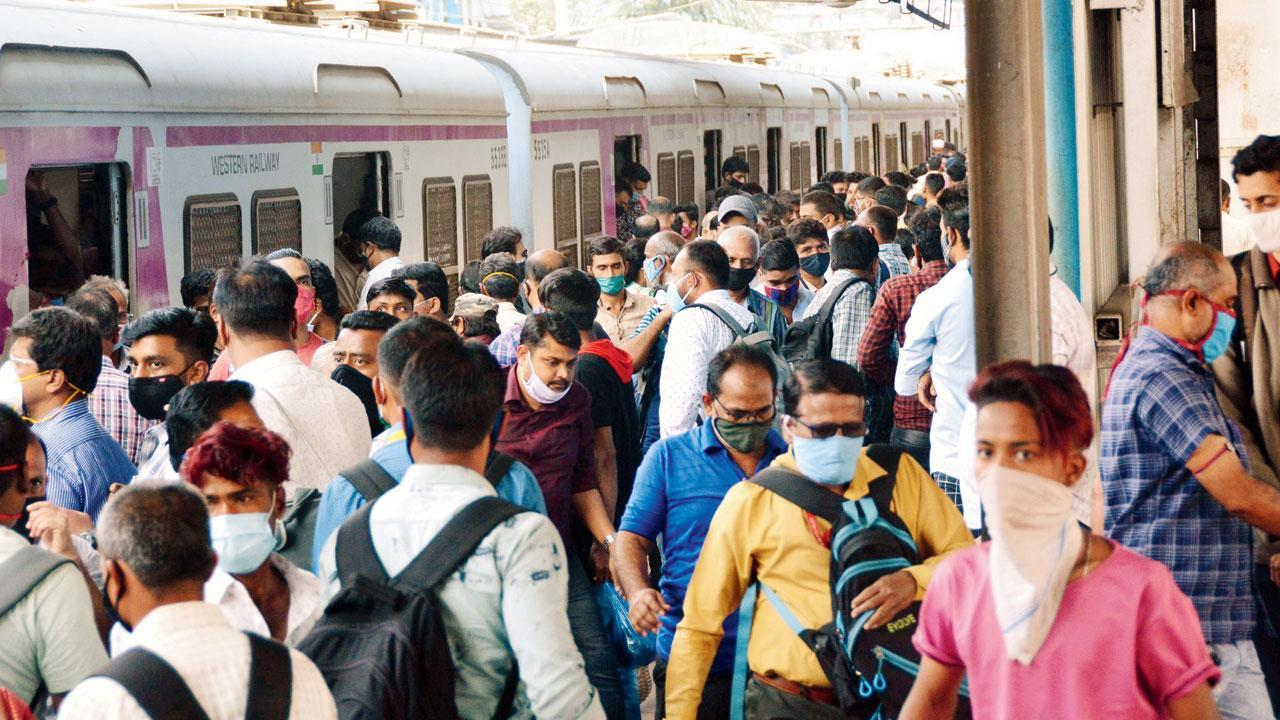Commuters have been welcoming the return of their locals for reasons that make no sense whatsoever

A crowd at Dadar station after locals were thrown open for all. Pic/Sayyed Sameer Abedi
I was recently sent a video on WhatsApp featuring two young men on their first train journey after almost a year. They began by moving backpacks from back to front, preparing for the inhuman crushing of bodies that takes place whenever one tries to enter a train. They then enacted the familiar request for an adjustment of seating arrangements, so six people could fit into a space meant for three. There was finally some faux weeping with relief as the train rolled in, and they embraced each other with joy.
ADVERTISEMENT
It was meant to be a spoof, of course, but served to highlight everything that is wrong about travelling by train in Bombay. It saddened me because the video brought back memories of my commute as a college student, from decades ago. I had a fixed local, as did everyone I knew at the time, and took the 7.36 from Malad station to get to Marine Lines in time for my first lecture. Missing that train meant getting into another one going to Borivli, then waiting until it returned and headed to Churchgate, adding an additional and unnecessary half hour to my already long commute. Thousands of people did the same thing daily, going back and forth simply because getting into a train from their station of choice was impossible.
I had a group of people who would travel with me, making us a group of regulars, one of many dotting the platform every morning. Travelling without regulars only made the journey harder, because it meant not having anyone to look out for you. My group would nominate a few hardy souls to stand closest to the incoming train, jumping in while it was still moving, and capturing seats for the rest of us stragglers who pushed our way in later. This seemed like an exciting thing to do, but we knew how fraught with danger the act really was. A tiny push from a disgruntled passenger at the back meant falling into the path of the train or slipping in between compartments and onto the tracks. It happened on more than one occasion, and the sight of bodies sliced in half by those steel wheels has stayed with me all through these years. It isn’t something anyone should be exposed to at the start of one’s day, let alone a teenager trying to get an education.
We used our commute to joke about everything under the sun, share a few snacks, celebrate the odd birthday or anniversary, and create friendships that often extended beyond those hours on the train into our regular lives. What we refused to acknowledge was the abnormality of how those relationships had been forged, under the kind of pressure no one — let alone students or senior citizens on the cusp of retirement — ought to have laboured under. We found ourselves in those situations because none of us had a choice. To miss that train meant missing a class, or even losing a job.
The lockdown of 2020 was undoubtedly a nightmare for millions of people who continue to rely on the local trains as a lifeline. I find it hard to believe that any of those millions missed their commute over the past year though. Staying home during the monsoon must have been even better, given how those difficult journeys become nothing short of nightmarish when the rain starts to appear. I find it hard to believe that any of the people forced to work from home during those rainy months had reason to miss travelling by bus or train.
News of the lockdown being lifted prompted another wave of videos on WhatsApp, this time of queues snaking outside stations and spilling onto the streets. It served as another reminder that life may go on after COVID-19, but things don’t get easier for anyone forced to commute by public transport. India’s corporate culture has no pity, and where you live means nothing to HR executives who get paid simply to ensure you are sitting behind a desk at 9 am. If this means travelling from Nala Sopara to Colaba, you have to do it with the meagre means at your disposal because the government can’t offer you anything better.
There is nothing romantic about travelling by train. It is inhuman, cruel, and difficult for the most vulnerable among us. For a city that claims to be the financial capital of one of the world’s allegedly fastest growing economies, it is a disgrace. We deserve better.
When he isn’t ranting about all things Mumbai, Lindsay Pereira can be almost sweet. He tweets @lindsaypereira. Send your feedback to mailbag@mid-day.com
The views expressed in this column are the individual’s and don’t represent those of the paper.
 Subscribe today by clicking the link and stay updated with the latest news!" Click here!
Subscribe today by clicking the link and stay updated with the latest news!" Click here!






